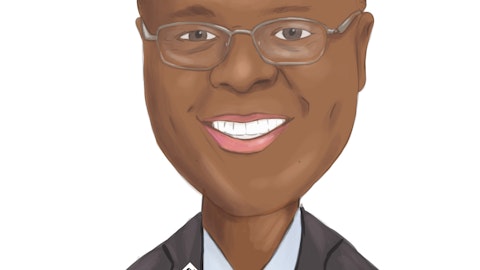Harold Carpenter: Yes, I don’t know. I’ve not really thought about or put any kind of math to what deposit costs could look like at the end of ’23 as far as beta calculations and into 2024. We’ve kind of talked about beta through the middle of the year of somewhere between 45% and 50% given the two rate hikes here in the near-term. So, I’m not really going out and kind of looked at what the longer-term deposit beta, but we fully expect that once the Fed stops raising rates that you’re likely to see deposit rate creep just due to competitive pressure. So, I don’t know how long we will talk about deposit rates, but I think when you get into the latter part of the year and, like you said, Mike, well, assuming the Fed, we’re in a higher rate environment for a longer period of time, that we fully anticipate that deposit ratio will continue to improve north in kind of a flat rate environment.
Michael Rose: Okay. Thanks for the color. Maybe just one separate follow-up question. Just wanted to kind of revisit where you guys are in terms of the BHG investment. Obviously, it’s done a lot of great things for you all over the years. I know you’ve kind of maybe hinted at maybe reducing the stake at some point in the future. But just want to — just given where the earnings contribution is and expected to be over the next years, it’s obviously going to be lower than it has in the past, any sort of strategic thought as we kind of move over the next short to intermediate term? And how you guys view that business? And what the longer-term strategic rationale of the investment is for you? Thanks.
Harold Carpenter: Yes. I’ll start and Terry can add his comments. First of all, I want to say that the partnership between us and BHG is strong. Matter of fact, I’ll have a Board meeting with the BHG folks here in about a couple of hours. But the valuation of Bankers Healthcare Group, we understand, we realize, we believe is kind of part of the bear case on our shares and trying to figure out what that number is, is important, but absent an arms link transaction is difficult to discern. That said, I think, we and BHG are on the same page. There are — there have been opportunities to reduce our stake, but right now the pricing is just not, we believe, at a point to where that makes it worthwhile for us. We think it’s a valuable asset.
We think it has created quite a bit of earnings momentum for us. We think BHG on another day could be worth quite a bit of money. All that said, the — our opinion about BHG is that a lesser ownership interest by ourselves probably wouldn’t be that bad. And we should consider any kind of worthwhile transaction that does that carefully.
Terry Turner: Yes. I think, Michael, maybe just to echo Harold’s comments, you started with the right assumption. I think what I’ll try to say is that if nobody had to be happy, we would like to reduce our dependence on BHG as a function of our earnings stream, not because we’re not bullish on the company and not because of any reason other than, it just has become investor conversations, investor outlooks, and so forth, it’s just hard to keep telling a story that so many people even disagree with or don’t understand. And so, again, at least for me from a strategic standpoint, I’d like to have less dependence on BHG as a function of my earnings stream. I think, to Harold’s point, I think, we’ve been good with that. I think BHG will be good with that.





